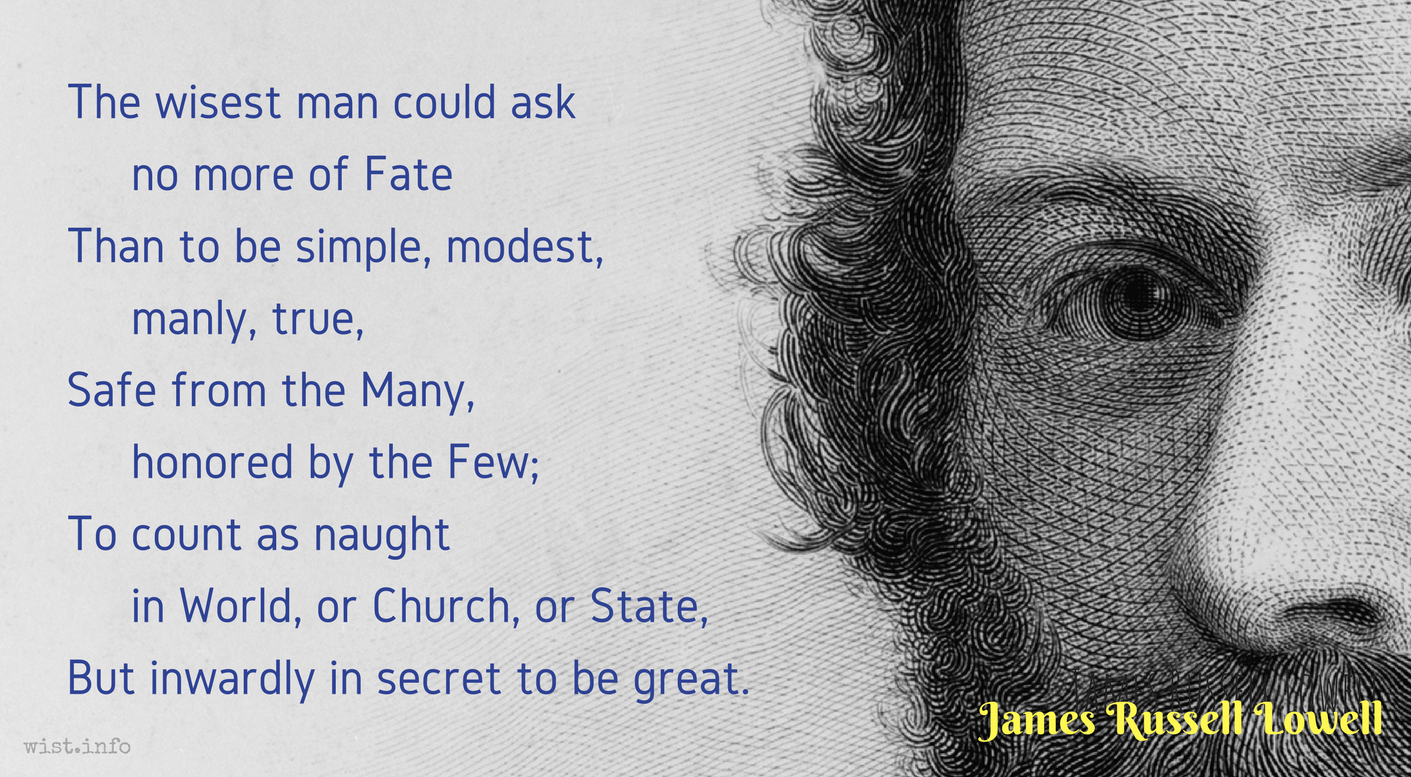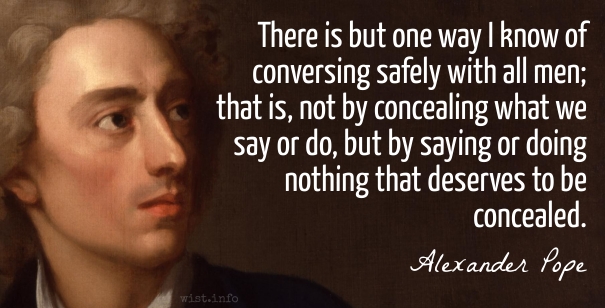How rich a man is all desire to know;
But none inquires if good he be or no.
Quotations about:
reputation
Note not all quotations have been tagged, so Search may find additional quotes on this topic.
The mill cannot grind with the water that’s past.
George Herbert (1593-1633) Welsh priest, orator, poet.
Jacula Prudentum, or Outlandish Proverbs, Sentences, &c. (compiler), # 153 (1640 ed.)
(Source)
Keepe good men company, and you shall be of the number.
George Herbert (1593-1633) Welsh priest, orator, poet.
Jacula Prudentum, or Outlandish Proverbs, Sentences, &c. (compiler), # 120 (1640 ed.)
(Source)
Never get a reputation for a small perfection, if you are trying for fame in a loftier area; the world can only judge by generals, and it sees that those who pay considerable attention to minutiæ, seldom have their minds occupied with great things. There are, it is true, exceptions; but to exceptions the world does not attend.
Edward George Bulwer-Lytton (1803-1873) English novelist and politician
The Disowned, ch. 2 [Talbot] (1828)
(Source)
See La Rochefoucauld.
What is the end of Fame? ’tis but to fill
A certain portion of uncertain paper:
Some liken it to climbing up a hill,
Whose summit, like all hills, is lost in vapour;
For this men write, speak, preach, and heroes kill,
And bards burn what they call their “midnight taper,”
To have, when the original is dust,
A name, a wretched picture, and worse bust.
It seems to be a wise provision of nature that the follies of men should be short-lived; but books interfere and immortalize them. A fool, not content with having bored all those who have lived with him, insists on tormenting generations to come; he would have his folly triumph over oblivion, which should have been as welcome to him as death; he wishes posterity to be informed of his existence, and he would have it remember for ever that he was fool.
[La nature sembloit avoir sagement pourvu à ce que les sottises des hommes fussent passagères, et les livres les immortalisent. Un sot devroit être content d’avoir ennuyé tous ceux qui ont vécu avec lui : il veut encore tourmenter les races futures, il veut que sa sottise triomphe de l’oubli, dont il auroit pu jouir comme du tombeau; il veut que la postérité soit informée qu’il a vécu, et qu’elle sache à jamais qu’il a été un sot.]
Charles-Lewis de Secondat, Baron de Montesquieu (1689-1755) French political philosopher
Persian Letters [Lettres Persanes], Letter 66, Rica to *** (1721) [tr. Davidson (1891)]
(Source)
Commonly paraphrased as "An author is a fool who, not content with having bored those who have lived with him, insists on boring future generations."
(Source (French)). Alternate translations:
Nature seems wisely to have provided that the Follies of Men shou'd pass away, but Books perpetuate them. A Fool ought to be satisfy'd with having teaz'd those who liv'd at the same Time with him: but he is for going further, and is resolved to plague the Generations to come he is resolv'd to make his Impertinence triumph over Oblivion, which he might have enjoy'd as well as his Grave: he will have Posterity know that such a one liv'd, and all future Ages be inform'd that he was a Fool.
[tr. Ozell (1736 ed.), Letter 64]
Nature seems to have provided, that the follies of men should be transient, but they by writing books render them permanent. A fool ought to content himself with having wearied those who lived with him: but he is for tormenting future generations; he is desirous that his folly should triumph over oblivion, which he ought to have enjoyed as well as his grave; he is desirous that posterity should be informed that he lived, and that it should be known for ever that he was a fool.
[tr. Floyd (1762)]
Nature has wisely provided that the follies of men should be ephemeral; but, unhappily, these very follies are immortalised in books. A fool ought to have been satisfied with boring all those who have lived with him; yet he insists on torturing future races; he is determined that his folly shall triumph over the oblivion in which he ought to have been able to find as much enjoyment as he does in his last slumber; he wishes posterity to know that he has lived, and remember forever that he was a fool.
[tr. Betts (1897)]
While nature seems wisely to have provided that the stupidities of men should be transient, books immortalize them. A fool should be content with boring everyone who has lived with him, but he further undertakes to torment future generations. He wants his folly to triumph over the oblivion which he should welcome like the sleep of the tomb; he wants to inform posterity that he has lived, and to have it forever remembered that he was a fool.
[tr. Healy (1964)]
Nature in her wisdom seems to have arranged for man's follies to be short-lived, and books render them immortal. A fool ought to be satisfied with having bored all his own contemporaries, but he also seeks to torment those as yet unborn; he wants his stupidity to triumph over oblivion, which he might, like the tomb, have enjoyed; but no, he wants posterity to be notified that he has lived, and he wants her to know, for all eternity, that he was an idiot.
[tr. Mauldon (2008), Letter 64]
Nature has so arranged things that the absurdities men say are passing things, but books give them immortal life. A fool ought to have been content to have annoyed those who live near him, but instead he wants the chance to torment future generations. He wants his absurdities to triumph over the complete oblivion that he really ought to have welcomed and enjoyed like a tomb. He wants posterity to be informed that he lived, and he wants it known for all time that he was a fool.
[tr. MacKenzie (2014), Letter 64]
I certainly had not the smallest reason to fear that the execution of this murderer of Roman citizens would cause me to be blamed by posterity. And indeed, even if this were a serious danger, I have always been convinced that unpopularity earned by honourable actions is not unpopularity at all, but renown.
[Certe verendum mihi non erat, ne quid hoc parricida civium interfecto invidiae mihi in posteritatem redundaret. Quodsi ea mihi maxime inpenderet tamen hoc animo fui semper, ut invidiam virtute partam gloriam, non invidiam putarem.]Marcus Tullius Cicero (106-43 BC) Roman orator, statesman, philosopher
Orationes in Catilinam [Catilinarian Orations], No. 1, § 12, cl. 29 (1.12.29) (63-11-08 BC) [tr. Grant (1960)]
(Source)
(Source (Latin)). Alternate translations:
Truly I have no reason to fear, least this Murderer of the Citizens being slain, any envy should rise against me for the future. But if never so much did hang over me, yet I was alwayes of this Judgment, to think Envy gotten by Vertue to be no Envy but Glory.
[tr. Wase (1671)]
I could have no reason to fear; that for the execution of a traitor and a parricide I should stand condemned by the voice of posterity. But let me add, were the severest censure to be the certain consequence, it has ever been my settled opinion, that reproach, when earned by virtue, is not reproach, but the truest glory.
[tr. Sydney (1795)]
Surely I had no cause to fear lest for slaying this parricidal murderer of the citizens any unpopularity should accrue to me with posterity. And if it did threaten me to ever so great a degree, yet I have always been of the disposition to think unpopularity earned by virtue and glory, not unpopularity.
[tr. Yonge (1856)]
Surely it was not to be dreaded by me, lest, if this parricide of the citizens were slain, any odium might redound for me to posterity. But if that impended over myself in particular, yet I have always been of this opinion, that I should consider the odium acquired by merit as glory and not as odium.
[tr. Mongan (1879)]
Certainly it was not to be feared to (by) me, lest any (thing) of unpopularity might redound to me unto posterity, this parricide of citizens being slain. But if it might impend (threaten) to me mostly (very much), yet I have been always with this mind, that I might think envy produced by virtue, glory, not envy.
[tr. Underwood (1885)]
Certainly it was not to be feared by me, lest any ill-will should redound to [affect] me for posterity, this parricide of citizens having been slain. But if this should threaten me very much, yet I have been always with [of] this mind, that I should think ill will produced by virtue, glory, not ill will.
[tr. Dewey (1916)]
Certainly I did not have to fear, lest with this parricide of citizens having been killed, anything of unpopularity might run over in posterity. And yet, if these were to threaten me especially, however, I have always been in this mind, so that I thought that unpopularity obtained by virtue is an honour, not unpopularity at all.
[IB Notes]
I have always been of the opinion that infamy earned by doing what is right is not infamy at all, but glory.
[E.g.]
HERMIONE: Since what I am to say must be but that
Which contradicts my accusation, and
The testimony on my part no other
But what comes from myself, it shall scarce boot me
To say “Not guilty.” Mine integrity,
Being counted falsehood, shall, as I express it,
Be so received. But thus: if powers divine
Behold our human actions, as they do,
I doubt not then but innocence shall make
False accusation blush and tyranny
Tremble at patience.William Shakespeare (1564-1616) English dramatist and poet
Winter’s Tale, Act 3, sc. 2, l. 23ff (3.2.23-33) (1611)
(Source)
Were you to reach the ripe old age of death,
instead of dying prattling in your crib,
would you have more fame in a thousand years?
What are ten centuries to eternity?
Less than the blinking of an eye compared
to the turning of the slowest of the spheres.[Che voce avrai tu più, se vecchia scindi
da te la carne, che se fossi morto
anzi che tu lasciassi il ‘pappo’ e ’l ‘dindi’,
pria che passin mill’anni? ch’è più corto
spazio a l’etterno, ch’un muover di ciglia
al cerchio che più tardi in cielo è torto.]Dante Alighieri (1265-1321) Italian poet
The Divine Comedy [Divina Commedia], Book 2 “Purgatorio,” Canto 11, l. 103ff (11.103-108) [Oderisi of Gubbio] (1314) [tr. Musa (1981)]
(Source)
Dante refers to two childish terms, which various translators note as
- "pappo" perhaps "father" (padre), or "bread" (pane) or just "baby food" (cf. English "pap")
- "dindi," probably "money" (danari/denaro)
(Source (Italian)). Alternate translations:
Ah! where's your 'vantage, if yon cast away,
In years, the muddy vesture of decay,
As when the swathe involves your tender frame?
Can you suppose her long, sonorious blast,
Thro' twice six thousand changing Moons, will last?
Yet, what is that to Heav'n's eternal year? --
Less, than the quick glance of human eye,
To that slow movement of the ample Sky,
That turns around the universal Sphere!
[tr. Boyd (1802), st. 20-21]
Shalt thou more
Live in the mouths of mankind, if thy flesh
Part shrivel’d from thee, than if thou hadst died,
Before the coral and the pap were left,
Or ere some thousand years have passed? and that
Is, to eternity compar’d, a space,
Briefer than is the twinkling of an eye
To the heaven’s slowest orb.
[tr. Cary (1814)]
More fame shalt thou enjoy, if once old age
Wear flesh away, than if thou hadst expired
Ere left the breast, or coral last admired?
A thousand years' eternity to thee
Far shorter than the eyebrow's movement fleet
To slowest orbit stars of heaven complete.
[tr. Bannerman (1850)]
What fame shalt thou have more, if old peel off
From thee thy flesh, than if thou hadst been dead
Before thou left the 'pappo' and the 'dindi,'
Ere pass a thousand years? which is a shorter
Space to the eterne, than twinkling of an eye
Unto the circle that in heaven wheels slowest.
[tr. Longfellow (1867)]
What fame wilt thou have more, if when it is old thou loose from thee thy flesh, than if thou hadst died before thou hadst left off thy child's prattle, ere a thousand years are past? which beside the eternal is a shorter space than is a movement of the eyelid beside the circle which in heaven turns the slowest.
[tr. Butler (1885)]
If thou stripp'st off thy aged flesh, wilt share
More fame than if thou'dst early died in grace
Before thou'dst ceased thy childish prattle,
A thousand years have past? A briefer space
Beside the eternal, than a glance of the eye
By that star's orbit, longest whirled through space.
[tr. Minchin (1885)]
What more fame shalt thou have, if thou strippest old flesh from thee, than if thou hadst died ere thou hadst left the pap and the chink, before a thousand years have passed? -- which is a shorter space compared to the eternal than a movement of the eyelids to the circle that is slowest turned in Heaven.
[tr. Norton (1892)]
What greater fame shalt thou have, if thou strip thee of thy flesh when old, than if thou hadst died ere thou wert done with pap and chink,
before a thousand years are passed? which is shorter space to eternity than the twinkling of an eye to the circle which slowest is turned in heaven.
[tr. Okey (1901)]
What more fame shalt thou have if thou put off thy flesh when it is old than if thou hadst died before giving up pappo and dindi, when a thousand years are past, which is a shorter space to eternity than the twinkling of an eye to the slowest turning circle in the heavens?
[tr. Sinclair (1939)]
Wilt thou have more fame if old age unwrap
Thy bones from withered flesh than if thy race
Ended ere thou wert done with bib and pap
Before a thousand years pass, -- shorter space
To eternity than is a blinked eye-lid
To the circle in heaven that moves at slowest pace?
[tr. Binyon (1943)]
Ten centuries hence, what greater fame hast thou,
Stripping the flesh off late, than if thou'dst died
Ere thou was done with gee-ger and bow-wow?
Ten centuries hence -- and that's a brief tide,
Matched with eternity, than one eye-wink
to that wheeled course Heaven's tardiest sphere must ride.
[tr. Sayers (1955)]
Though loosed from flesh in old age, will you have
in, say, a thousand years, more reputation
than if you went from child's play to the grave?
What, to eternity, is a thousand years?
Not so much as the blinking of an eye
to the turning of the slowest of the spheres.
[tr. Ciardi (1961)]
What greater fame will you have if you strip off your flesh when it is old than if you had died before giving up pappo and dindi, when a thousand years have passed, which is a short4er space compared to the eternal than the movement of the eyelids to that circle which is slowest turned in heaven?
[tr. Singleton (1973)]
What greater name will you have, if you are old
When you put aside your flesh, than if you had died
Before you had given up baby-talk and rattles,
Once a thousand years have passed? And that is a shorter
Space to the eternal than the flash of an eyelid
To the circle which turns in the heavens most slowly.
[tr. Sisson (1981)]
Before a thousand years have passed -- a span
that, for eternity, is less space than
an eyeblink for the slowest sphere in heaven --
would you find greater glory if you left
your flesh when it was old than if your death
had come before your infant words were spent?
[tr. Mandelbaum (1982)]
What more acclaim will you have if you strip off your flesh when it is old, than if you had died before you left off saying ‘pappo’ and ‘dindi,’
before a thousand years have passed? which is a briefer space compared with eternity than the blinking of an eye to the circle that turns slowest in the sky
[tr. Durling (2003)]
What more fame will you have, before a thousand years are gone, if you disburden yourself of your flesh when old, than if you had died before you were done with childish prattle? It is a shorter moment, in eternity, than the twinkling of an eye is to the orbit that circles slowest in Heaven.
[tr. Kline (2002)]
What more renown will you have if you strip
your flesh in age away than if you died
before you’d left off lisping "Din-dins!", "Penth!"
when once a thousand years have passed, a space
that falls far short of all eternity --
an eye blink to the slowest turning sphere.
[tr. Kirkpatrick (2007)]
Will greater fame be yours if you put off
your flesh when it is old than had you died
with pappo and dindi still upon your lips
after a thousand years have passed? To eternity,
that time is shorter than the blinking of an eye
is to one circling of the slowest-moving sphere.
[tr. Hollander/Hollander (2007)]
Suppose you get to be old, before you discard
Your flesh, how much more fame will go with your name,
After a thousand years, if "Pappy" and "Mammy"
were still on your tongue when you died? And a thousand years
Compared with life eternal, is like an eyelid
Flutter compared with the slowest stars int he skies.
[tr. Raffel (2010)]
Nothing reveals more clearly men’s attitude to learning and literature, and what use they think these are to the State, than the low price they put on them, and their opinion of those who have chosen to practice them.
[Rien ne découvre mieux dans quelle disposition sont les hommes à l’égard des sciences et des belles-lettres, et de quelle utilité ils les croient dans la république, que le prix qu’ils y ont mis, et l’idée qu’ils se forment de ceux qui ont pris le parti de les cultiver.]
Jean de La Bruyère (1645-1696) French essayist, moralist
The Characters [Les Caractères], ch. 12 “Of Opinions [Des Jugements],” § 17 (12.17) (1688) [tr. Stewart (1970)]
(Source)
(Source (French)). Alternate translations:
Nothing discovers better what disposition men have to Knowledge and Learning, and how profitable they are esteem'd to the Publick, than the price which is set on them, and the Idea they have formed of those who have taken the pains to improve them.
[Bullord ed. (1696)]
Nothing discovers better what regard Men have to Science and polite Learning, and how profitable they esteem them to the Publick, than the price they set on them, and the Idea they form to themselves of those who have taken the pains to cultivate them.
[Curll ed. (1713)]
Nothing better manifests the Regard paid to the Sciences and Literature, and Men's Sense of their Utility to the Public, than the Recompences assigned to them, and the Repute in which they stand who excel in them.
[Browne ed. (1752)]
Nothing better demonstrates how men regard science and literature, and of what use they are considered in the State, than the recompense assigned to them, and the idea generally entertained of those persons who resolve to cultivate them.
[tr. Van Laun (1885)]
If men knew how to blush at their own actions, how many crimes, and not only those that are hidden, but those that are public and well known, would never be committed!
[Si l’homme savait rougir de soi, quels crimes, non seulement cachés, mais publics et connus, ne s’épargnerait-il pas!]
Jean de La Bruyère (1645-1696) French essayist, moralist
The Characters [Les Caractères], ch. 11 “Of Mankind [De l’Homme],” § 151 (11.151) (1688) [tr. Van Laun (1885)]
(Source)
(Source (French)). Alternate translations:
If men could blush at their own actions, how many sins, publick and private, would they save by it?
[Bullord ed. (1696)]
If Men knew how to blush at their own Actions, how many Crimes, publick and private, would they save by it!
[Curll ed. (1713)]
If Men could blush for themselves, how many Sins, public and private, would they save by it!
[Browne ed. (1752)]
If a man knew how to blush at his own actions, what crimes, not only secret but public and overt, would he not spare himself!
[tr. Stewart (1970)]
Dignity of character ought to be graced by a house; but from a house it is not wholly derived. A master is not to be honored by a house; but a house by its master.
[Ornanda enim est dignitas domo, non ex domo tota quaerenda, nec domo dominus, sed domino domus honestanda est.]
Marcus Tullius Cicero (106-43 BC) Roman orator, statesman, philosopher
De Officiis [On Duties; On Moral Duty; The Offices], Book 1, ch. 39 (1.39) / sec. 139 (44 BC) [tr. McCartney (1798)]
(Source)
(Source (Latin)). Alternate translations:
It is well if a man can enhance that credit and reputation he has gotten by the splendour of his house; but he must not depend on his house alone for it; for the master ought to bring honour to his fine seat, and not the fine seat bring honour to its master.
[tr. Cockman (1699)]
For dignity should be adorned by a palace, but not be wholly sought from it: -- the house ought to be ennobled by the master, and not the master by the house.
[tr. Edmonds (1865)]
In truth, high standing in the community should be adorned by a house, not sought wholly from a house; nor should the owner be honored by the house, but the house by the owner.
[tr. Peabody (1883)]
The house should not constitute, though it may enhance, the dignity of the master; let the master honour the house, not the house the master.
[tr. Gardiner (1899)]
Your house may add lustre to your dignity, but it will not suffice that you should derive all your dignity from your house: the master should ennoble the house, not the house the master.
[ed. Harbottle (1906)]
The truth is, a man's dignity may be enhanced by the house he lives in, but not wholly secured by it; the owner should bring honour to his house, not the house to its owner.
[tr. Miller (1913)]
A house may enhance a man's dignity, but it should not be the only source of dignity; the house should not glorify its owner, but he should enhance it.
[tr. Edinger (1974)]
But the best inheritance that fathers can give their children, more precious than any patrimony however large, is a reputation for virtue and for worthy deeds, which if the child disgraces, his conduct should be branded as infamous and impious.
[Optima autem hereditas a patribus traditur liberis omnique patrimonio praestantior gloria virtutis rerumque gestarum, cui dedecori esse nefas et vitium iudicandum est.]
Marcus Tullius Cicero (106-43 BC) Roman orator, statesman, philosopher
De Officiis [On Duties; On Moral Duty; The Offices], Book 1, ch. 33 (1.33) / sec. 121 (44 BC) [tr. Peabody (1883)]
(Source)
(Source (Latin)). Alternate translation:
Now the noblest inheritance that can ever be left by a father to his son, and far exceeding that of houses and lands, is the fame of his virtues and glorious actions; and for a son to live so, as is unworthy of the name and reputation of his ancestors, is the basest and most abominable thing in the world.
[tr. Cockman (1699)]
The best inheritance left by a father to his children, superior to every other patrimony, is the honor of a virtuous conduct, and the glory of his public transactions. And it is base and criminal by an unworthy conduct, to bring disgrace upon a father's reputation.
[tr. McCartney (1798)]
Now, the best inheritance a parent can leave a child -- more excellent than any patrimony -- is the glory of his virtue and his deeds; to bring disgrace on which ought to be regarded as wicked and monstrous.
[tr. Edmonds (1865)]
The noblest heritage, the richest patrimony a father can bequeath to his children is a reputation for virtue and noble deeds. To tarnish his good name is a sin and a crime.
[tr. Gardiner (1899)]
The best legacy a father can leave to his children, a legacy worth far more than the largest patrimony, is the fame of a virtuous and well-spent life. He who disgraces such a bequest is deserving of infamy.
[ed. Harbottle (1906)]
The noblest heritage, however, that is handed down from fathers to children, and one more precious than any inherited wealth, is a reputation for virtue and worthy deeds; and to dishonour this must be branded as a sin and a shame.
[tr. Miller (1913)]
The best heritage that descends from fathers to sons is the fame for honesty and great deeds. Such fame surpasses any legacy. We must judge it a crime and a shame to disgrace it.
[tr. Edinger (1974)]
Even here
Worth wins her due, and there are tears to flow,
And human hearts to feel for human woe.[Sunt hic etiam sua praemia laudi,
Sunt lacrimae rerum et mentem mortalia tangunt.]Virgil (70-19 BC) Roman poet [b. Publius Vergilius Maro; also Vergil]
The Aeneid [Ænē̆is], Book 1, l. 461ff (1.461-462) (29-19 BC) [tr. Taylor (1907), st. 61, l. 543ff]
(Source)
Aeneas, on seeing murals of the Trojan Wars in Carthage. (Source (Latin)). Alternate translations:
Lo! Priam here, reward here vertue finds;
Troy teares, and humane sufferings pittying minds.
[tr. Ogilby (1649)]
Ev'n the mute walls relate the warrior's fame,
And Trojan griefs the Tyrians' pity claim.
[tr. Dryden (1697)]
Even here praiseworthy deeds meet with due reward: here are tears for misfortunes, and the breasts are touched with human woes.
[tr. Davidson/Buckley (1854)]
Aye, praise waits on worth
E'en in this corner of the earth;
E'en here the tear of pity springs,
And hearts are touched by human things.
[tr. Conington (1866)]
Worthy deeds e'en here are praised.
And mortal sufferings move their thoughts and tears.
[tr. Cranch (1872), l. 601ff]
Here too is the meed of honour, here mortal estate touches the soul to tears.
[tr. Mackail (1885)]
And even here belike deed hath its own reward.
Lo here are tears for piteous things that touch men's hearts anigh.
[tr. Morris (1900)]
Virtue's wage is given --
O even here! Here also there be tears
for what men bear, and mortal creatures feel
each other's sorrow.
[tr. Williams (1910)]
Here, too, virtue has its due rewards; here, too, there are tears for misfortune and mortal sorrows touch the heart.
[tr. Fairclough (1916)]
Look! even here there are rewards for praise,
There are tears for things, and what men suffer touches
The human heart.
[tr. Humphries (1951)]
Here too we find virtue somehow rewarded.
Tears in the nature of things, hearts touched by human transience.
[tr. Day Lewis (1952)]
Here, too, the honorable finds its due
and there are tears for passing things; here, too,
things mortal touch the mind.
[tr. Mandelbaum (1971), l. 654ff]
Even so far away
Great valor has due honor; they weep here
For how the world goes, and our life that passes
Touches their hearts.
[tr. Fitzgerald (1981), l. 627ff]
Here too there is just reward for merit, there are tears for suffering and men's hearts are touched by what man has to bear.
[tr. West (1990)]
Here too virtue has its rewards, here too
there are tears for events, and mortal things touch the heart.
[tr. Kline (2002)]
Here, too, honor matters;
Here are the tears of the ages, and minds touched
By human suffering.
[tr. Lombardo (2005)]
Even here, merit will have its true reward ...
even here, the world is a world of tears
and the burdens of mortality touch the heart.
[tr. Fagles (2006)]
Here too, glory has its rewards; the world weeps, and mortal matters move the heart.
[tr. Bartsch (2021)]
We’d all like a reputation for generosity, and we’d all like to buy it cheap.
Mignon McLaughlin (1913-1983) American journalist and author
The Neurotic’s Notebook, ch. 9 (1963)
(Source)
Even if glory has nothing in itself to justify seeking it, yet it follows virtue like a shadow.
[Etsi enim nihil habet in se gloria cur expetatur, tamen virtutem tamquam umbra sequitur.]
Marcus Tullius Cicero (106-43 BC) Roman orator, statesman, philosopher
Tusculan Disputations [Tusculanae Disputationes], Book 1, ch. 45 (1.45) / sec. 109 (45 BC) [tr. Douglas (1985)]
(Source)
(Source (Latin)). Alternate translations:
For though Glory have nothing in it self, why it should be pursu'd, yet it follows Vertue as its shadow.
[tr. Wase (1643)]
For although there be nothing in glory to make it desirable, yet it follows virtue like a shadow.
[tr. Main (1824)]
Glory follows virtue as it it were its shadow.
[Source (1826)]
For even if glory contain nothing for which it is desirable of itself, yet it follows as the shadow of virtue.
[tr. Otis (1839)]
For although there be nothing in glory to make it desirable, yet it follows virtue as its shadow.
[tr. Yonge (1853)]
Though as to fame, there is nothing in it that should make it an object of desire; but it follows virtue like its shadow.
[tr. Peabody (1886)]
Glory, though it have in itself nothing for which we should desire it, attends virtue like its shadow.
[tr. Black (1889)]
Although glory is not to be sought for its own sake, it follows virtue like a shadow.
[tr. Habinek (1996)]
Even if glory has nothing in it to justify our seeking it, yet it follows virtue like a shadow.
[tr. Davie (2017)]
Men are willing to keep their evil characters if they can but get rid of their evil reputations. They are scrupulously studious of appearances.
Frank W. Boreham (1871-1959) Anglo-Australian preacher
“The Leopard’s Skin,” sec. 4, The Three Half-Moons (1929)
(Source)
It is better to be praised by another than by oneself.
[βέλτερον ὑφ’ ἑτέρου ἢ ὑφ’ ἑαυτοῦ ἐπαινέεσθαι.]
Democritus (c. 460 BC - c. 370 BC) Greek philosopher
Frag. 114 (Diels) [tr. Freeman (1948)]
(Source)
Original Greek. Diels citation "114. (117 N.) DEMOKRATES. 82." Freeman notes this as one of the Gnômae, from a collection called "Maxims of Democratês," but because Stobaeus quotes many of these as "Maxims of Democritus," they are generally attributed to the latter. The same translation is made by @sentantiq (2016).
Alternate translation: "It is better to be praised by others than by oneself." [tr. Barnes (1987)]
Few are those who wish to be endowed with virtue rather than to seem so.
[Virtute enim ipsa non tam multi praediti esse quam videri volunt.]
Marcus Tullius Cicero (106-43 BC) Roman orator, statesman, philosopher
Laelius De Amicitia [Laelius on Friendship], ch. 26 / sec. 98 (44 BC)
Common translation. Alternates:
- "For not so many desire to be endowed with virtue itself, as to seem to be so." [tr. Edmonds (1871)]
- "For there are not so many possessed of virtue as there are that desire to seem virtuous." [tr. Peabody (1887)]
- "For many wish not so much to be, as to seem to be, endowed with real virtue." [tr. Falconer (1923)]
Be your character what it will, it will be known; and nobody will take it up on your own word. Never imagine that anything you can say yourself will varnish your defects or add lustre to your perfections! but, on the contrary, it may, and nine times in ten will, make the former more glaring, and the latter obscure.
Lord Chesterfield (1694-1773) English statesman, wit [Philip Dormer Stanhope]
Letter to his son, #166 (19 Oct 1748)
(Source)
Oh friends, be men! Deep treasure in your hearts
An honest shame, and, fighting bravely, fear
Each to incur the censure of the rest.
Of men so minded more survive than die,
While dastards forfeit life and glory both.[ὦ φίλοι ἀνέρες ἔστε, καὶ αἰδῶ θέσθ᾽ ἐνὶ θυμῷ,
ἀλλήλους τ᾽ αἰδεῖσθε κατὰ κρατερὰς ὑσμίνας.
αἰδομένων δ᾽ ἀνδρῶν πλέονες σόοι ἠὲ πέφανται:
φευγόντων δ᾽ οὔτ᾽ ἂρ κλέος ὄρνυται οὔτέ τις ἀλκή.]Homer (fl. 7th-8th C. BC) Greek author
The Iliad [Ἰλιάς], Book 15, l. 561ff (15.561) [Ajax] (c. 750 BC) [tr. Cowper (1791), l. 679ff]
(Source)
Original Greek. Alternate translations:
Good friends, bring but yourselves to feel the noble stings of shame
For what ye suffer, and be men. Respect each other’s fame;
For which who strives in shame’s fit fear, and puts on ne’er so far,
Comes oft’ner off. Then stick engag’d; these fugitives of war
Save neither life, nor get renown, nor bear more mind than sheep.
[tr. Chapman (1611), l. 508ff]
O Greeks! respect your fame,
Respect yourselves, and learn an honest shame:
Let mutual reverence mutual warmth inspire,
And catch from breast to breast the noble fire.
On valour's side the odds of combat lie,
The brave live glorious, or lamented die;
The wretch that trembles in the field of fame,
Meets death, and worse than death, eternal shame.
[tr. Pope (1715-20)]
O my friends, be men, and set honour in your hearts, and have reverence for each other during the vehement conflicts. For more of those men who reverence each other are saved than slain; but of the fugitives, neither glory arises, nor any defence.
[tr. Buckley (1860)]
Brave comrades, quit ye now like men;
Bear a stout heart; and in the stubborn fight
Let each to other mutual succour give;
By mutual succour more are sav’d than fall;
In timid flight nor fame nor safety lies.
[tr. Derby (1864)]
My friends, be men, and fear dishonour; quit yourselves in battle so as to win respect from one another. Men who respect each other's good opinion are less likely to be killed than those who do not, but in flight there is neither gain nor glory.
[tr. Butler (1898)]
My friends, be men, and take ye shame in your hearts, and have shame each of the other in the fierce conflict. Of men that have shame more are saved than are slain; but from them that flee springeth neither glory nor any avail.
[tr. Murray (1924)]
Friends, respect yourselves as men,
respect each other in the moil of battle!
Men with a sense of shame survive
more often than they perish. Those who run
have neither fighting power nor any honor.
[tr. Fitzgerald (1974)]
Be men, my friends! Discipline fill your hearts!
Dread what comrades say of you here in bloody combat!
When men dread that, more men come through alive --
when soldiers break and run, good-bye glory,
good-bye all defenses!
[tr. Fagles (1990), l. 651ff]
Now, dear friends, be men, keep hold of your valorous spirit,
feel shame, each on account of the rest in the violent combats;
more of the men who feel such shame live safely than perish,
while from the ones who flee no glory nor any defense springs.
[tr. Merrill (2007), l. 529ff]
The less you speak of your greatness, the more I will think of it.
Francis Bacon (1561-1626) English philosopher, scientist, author, statesman
Remark to Sir Edward Coke
(Source)
Quoted in Joseph Sortain, The Life of Francis, Lord Bacon (1851).
To expose vices to the ridicule of all the world is a severe blow to them. Reprehensions are easily suffered, but not so ridicule. People do not mind being wicked; but they object to being made ridiculous.
[C’est une grande atteinte aux vices que de les exposer à la risée de tout le monde. On souffre aisément des répréhensions, mais on ne souffre point la raillerie. On veut bien être méchant, mais on ne veut point être ridicule.]
Molière (1622-1673) French playwright, actor [stage name for Jean-Baptiste Poquelin]
Tartuffe, Preface (1664) [tr. Van Laun (1876)]
(Source)
Alt. trans.: "To expose vices to everyone’s laughter is to deal them a mighty blow. People easily endure reproofs, but they cannot at all endure being made fun of. People have no objection to being considered wicked, but they are not willing to be considered ridiculous." [tr. Kerr]
Slavery is doomed, and that within a few years. Even Judge Douglas admits it to be an evil, and an evil can’t stand discussion. In discussing it we have taught a great many thousands of people to hate it who had never given it a thought before. What kills the skunk is the publicity it gives itself.
Abraham Lincoln (1809-1865) American lawyer, politician, US President (1861-65)
Interview with David R. Locke (1859)
(Source)
Recounted in A. T. Rice, Reminiscences of Abraham Lincoln, ch. 25 (1896).
I make this distinkshun between charakter and reputashun — reputashun iz what the world thinks ov us, charakter is what the world knows of us.
[I make this distinction between character and reputation — reputation is what the world thinks of us, character is what the world knows of us.]
Josh Billings (1818-1885) American humorist, aphorist [pseud. of Henry Wheeler Shaw]
Everybody’s Friend, Or; Josh Billing’s Encyclopedia and Proverbial Philosophy of Wit and Humor, “Lobstir Sallad” (1874)
(Source)
A slander iz like a hornet, if you kant kill it dead the fus blo, you better not strike at it.
[A slander is like a hornet, if you can’t kill it dead the first blow, you better not strike at it.]
Josh Billings (1818-1885) American humorist, aphorist [pseud. of Henry Wheeler Shaw]
Everybody’s Friend, Or; Josh Billing’s Encyclopedia and Proverbial Philosophy of Wit and Humor, “Lobstir Sallad” (1874)
(Source)
Be more concerned with your character than your reputation, because your character is what you really are, while your reputation is merely what others think you are.
John Wooden (1910-2010) American basketball player and coach
They Call Me Coach, ch. 9, epigram (1972)
(Source)
Character is much easier kept than recovered.
Thomas Paine (1737-1809) American political philosopher and writer
The American Crisis, #13 (19 Apr 1783)
(Source)
The wisest man could ask no more of Fate
Than to be simple, modest, manly, true,
Safe from the Many, honored by the Few;
To count as naught in World, or Church, or State,
But inwardly in secret to be great.James Russell Lowell (1819-1891) American diplomat, essayist, poet
“Jeffries Wyman,” The Nation #484 (8 Oct 1874)
(Source)
Even doubtful Accusations leave a Stain behind them.
Thomas Fuller (1654-1734) English physician, preacher, aphorist, writer
Gnomologia: Adages and Proverbs, #1395 (1732)
(Source)
Perhaps a man’s character is like a tree, and his reputation like its shadow; the shadow is what we think of it; the tree is the real thing.
No man ever stood the lower in my estimation for having a patch in his clothes; yet I am sure that there is greater anxiety, commonly, to have fashionable, or at least clean and unpatched clothes, than to have a sound conscience.
It used to be a good hotel, but that proves nothing — I used to be a good boy, for that matter. Both of us have lost character of late years.
Mark Twain (1835-1910) American writer [pseud. of Samuel Clemens]
The Innocents Abroad, ch. 57 (1869)
(Source)
A man is what he is, not what men say he is. His character no man can touch. His character is what he is before his God and his Judge; and only himself can damage that. His reputation is what men say he is. That can be damaged; but reputation is for time, character is for eternity.
Glorious men are the scorn of wise men, the admiration of fools, the idols of parasites, and the slaves of their own vaunts.
Francis Bacon (1561-1626) English philosopher, scientist, author, statesman
“Of Vain-Glory,” Essays, No. 54 (1625)
(Source)
The best foreign policy is to live our daily lives in honesty, decency, and integrity; at home, making our own land a more fitting habitation for free men; and abroad, joining with those of like mind and heart, to make of the world a place where all men can dwell in peace.
Dwight David Eisenhower (1890-1969) American general, US President (1953-61)
Inaugural Gabriel Silver lecture, Columbia University (23 Mar 1950)
When you get to be President, there are all those things, the honors, the twenty-one gun salutes, all those things. You have to remember it isn’t for you. It’s for the Presidency.
It is a sad fate for a man to die
Too well known to everybody else,
And still unknown to himself.[Illi mors gravis incubate
Qui notus nimis omnibus
Ignotus moritur sibi.]
I will not deny but that the best apology against false accusers is silence and sufferance, and honest deeds set against dishonest words.
Time never fails to bring every exalted reputation to a strict scrutiny: the world, in passing the judgment that is never to be reversed, will deny all partiality even to the name of Washington. Let it be denied, for its justice will confer glory.
Many men and many women enjoy popular esteem, not because they are known, but because they are not.
Nicolas Chamfort (1741-1794) French writer, epigrammist (b. Nicolas-Sébastien Roch)
(Attributed)
(Source)
Attributed in Maturin M. Ballou, Notable Thoughts About Women, #3144 (1882).
Calumny is like a wasp which harasses you. Raise no hand against it unless you’re sure of killing it, for otherwise it will return to the charge more furious than ever.
[La calomnie est comme la guêpe qui vous importune, et contre laquelle il ne faut faire aucun mouvement, à moins qu’on ne soit sûr de la tuer, sans quoi elle revient à la charge, plus furieuse que jamais.]
Nicolas Chamfort (1741-1794) French writer, epigrammist (b. Nicolas-Sébastien Roch)
Products of Perfected Civilization [Produits de la Civilisation Perfectionée], Part 1 “Maxims and Thoughts [Maximes et Pensées],” ch. 5, ¶ 302 (1795) [tr. Dusinberre (1992)]
(Source)
(Source (French)). Alternate translations:
Calumny is like the wasp which worries you, which it were best not to try to get rid of unless you are sure of slaying it; for otherwise it will return to the charge more furious than ever.
[Source (1872)]
Scandal is an importunate wasp, against which we must make no movement unless we are quite sure that we can kill it; otherwise it will return to the attack more furious than ever.
[tr. Mathers (1926)]
Calumny is like some annoying wasp, against which one must make no move unless one is sure of killing it, or else it will return to the charge more furiously than ever.
[tr. Merwin (1969)]
Calumny is a wasp that bothers you, and against which you mustn't make any movement unless you are sure to kill it; otherwise it will attack you more furiously than before.
[tr. Siniscalchi (1994)]
Slander is like a wasp which is pestering you but which you mustn't take any action against unless he happens to turn round.
[tr. Parmée (2003), ¶ 182]
ANTONY: The evil men do lives after them;
The good is oft interred with their bones.William Shakespeare (1564-1616) English dramatist and poet
Julius Caesar, Act 3, sc. 2, l. 84ff (3.2.84-85) (1599)
(Source)
Say nothing good of yourself, you will be distrusted; say nothing bad of yourself, you will be taken at your word.
Joseph Roux (1834-1886) French Catholic priest
Meditations of a Parish Priest: Thoughts, Part 5 “Joy, Suffering, Fortune,” #22 (1886) [tr. Hapgood]
(Source)
Besides, there are two things that will be believed of any man whatsoever, and one of them is that he has taken to drink.
You should show the least vanity about your greatest gifts. Content yourself with doing: leave saying to others.
[Afecte menos sus mayores eminencias. Conténtese con hacer, y deje para otros el decir.]
Baltasar Gracián y Morales (1601-1658) Spanish Jesuit priest, writer, philosopher
The Art of Worldly Wisdom [Oráculo Manual y Arte de Prudencia], § 295 (1647) [tr. Maurer (1992)]
(Source)
(Source (Spanish)). Alternate translations:
Shew as little as thou canst thy most eminent qualities. Rest satisfied to doe, and leave it to others to talk of it.
[Flesher ed. (1685)]
The greater your exploits the less you need affect them: content yourself with doing, leave the talking to others.
[tr. Jacobs (1892)]
Real achievement needs no such affectation. Rest in accomplishment, and leave talk to others. Do, and do not brag.
[tr. Fischer (1937)]
Make the least ado about your greatest gifts. Be content to act, and leave the talking to others.
[Source]
The greatest height of heroism to which an individual, like a people, can attain is to know how to face ridicule; better still, to know how to make oneself ridiculous and not to shrink from the ridicule.
Miguel de Unamuno (1864-1936) Spanish philosopher and writer [Miguel de Unamuno y Jugo]
The Tragic Sense of Life [Del Sentimiento Trágico de la Vida], Conclusion (1913) [tr. Flitch (1921)]
(Source)


















































